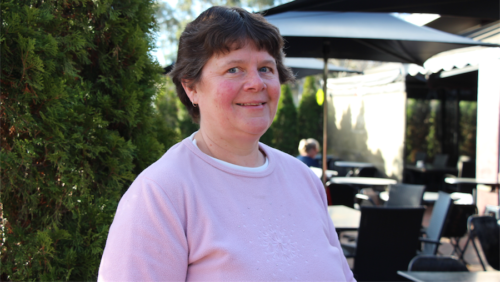
WHEN Janelle Billett was left jobless after 17 years working as an administration officer in Mitchell, it was scary for her to think about finding a new career.
Her boss, a family member who owned the mechanical store where she had worked, was retiring, which meant Janelle would need a new job.
By coincidence, her brother spotted an advertisement about a mature-aged workers pilot, which was calling on people aged 55 and over to take part, and said: “Why don’t you give this a go?”
Run by Achieve by Design, the goal of the Mature Aged Workers Project was to explore whether people over 55 would consider disability support work as a way to find meaning, flexible work and extra funds for retirement, while at the same time helping others live a good life.
“When we talked to people seeking support, we heard that they wanted someone they can trust and enjoy being with,” says Susan Beaumont, who is heading Achieve by Design in partnership with David Hill.
“Older people bring a host of great life skills and experience which, when combined with some basic training, makes them ideal support workers.
“The most important thing about the project was the ‘perfect match’ between what many people with disability are looking for, in terms of support, and what people over 55 are looking for to meet their need for flexible, meaningful work.”
While Janelle is only 54, she was allowed to take part in the pilot and agrees with Susan, saying the project has given her a chance to continue to work in a meaningful way.
“I love being out and about,” says Janelle, who has been focusing more on her health since her mum was diagnosed with dementia.
“My mum has dementia and one of the risks for dementia is spending a lot of time sitting. It’s really been front of mind for me now.”
But Janelle’s mum, who lives in aged care, has inspired her to become a support worker in more ways than one.
“It’s been a massive learning curve for the past four years with my mum in aged care,” she says.
“The turnover of staff is high and there’s just not enough staff to give people the care that they need.
“They’re fed, they’re clean, they’re safe but there’s little emotional support or capacity for staff to spend time with them, especially those that are bedridden.”
Janelle doesn’t want this for people with a disability (or people in aged care) and while she was reluctant about what the role would entail, she says it was a driving force for her to become a support worker.
“I wasn’t really looking at being a support worker or doing anything in that role,” she says.
“I was thinking, I don’t really want to do that. But I didn’t realise the broad range of things I could do. I also still had to pay my bills.”
The roles for support workers vary from person to person and Susan says they could be doing things such as cooking, helping people with their scrapbooks, taking someone to play lawn bowls or teaching someone to take photos or IT.
Janelle now supports two women with disabilities and has since formed a friendship with them, but says it doesn’t get in the way of her professionalism.
“[With one of the women] I spend one day going to the pool and making sure she gets in and out safely,” she says.
“I also help with meal preparation and laundry because she has a downstairs laundry.
“She can’t do a lot of things that many of us take for granted.”
The other woman she supports has an intellectual disability and Janelle says she often takes her to her gymnastics class or to the mall if she needs to buy anything.
“She still lives at home with her parents but she might need to pick up something or she might need to buy a present for someone,” says Janelle who enjoys the variety of the role, which has even taken her to some fun events.
She’s since gone to a few concerts with one of the women, who has a similar passion for the same type of music.
“The need for support workers is huge so you’ll likely find someone that’s interested in things you’re interested in,” she says.
“And it could make a huge difference to someone’s isolation or their life.”
achievebydesign.com.au
Who can be trusted?
In a world of spin and confusion, there’s never been a more important time to support independent journalism in Canberra.
If you trust our work online and want to enforce the power of independent voices, I invite you to make a small contribution.
Every dollar of support is invested back into our journalism to help keep citynews.com.au strong and free.
Thank you,
Ian Meikle, editor





Leave a Reply